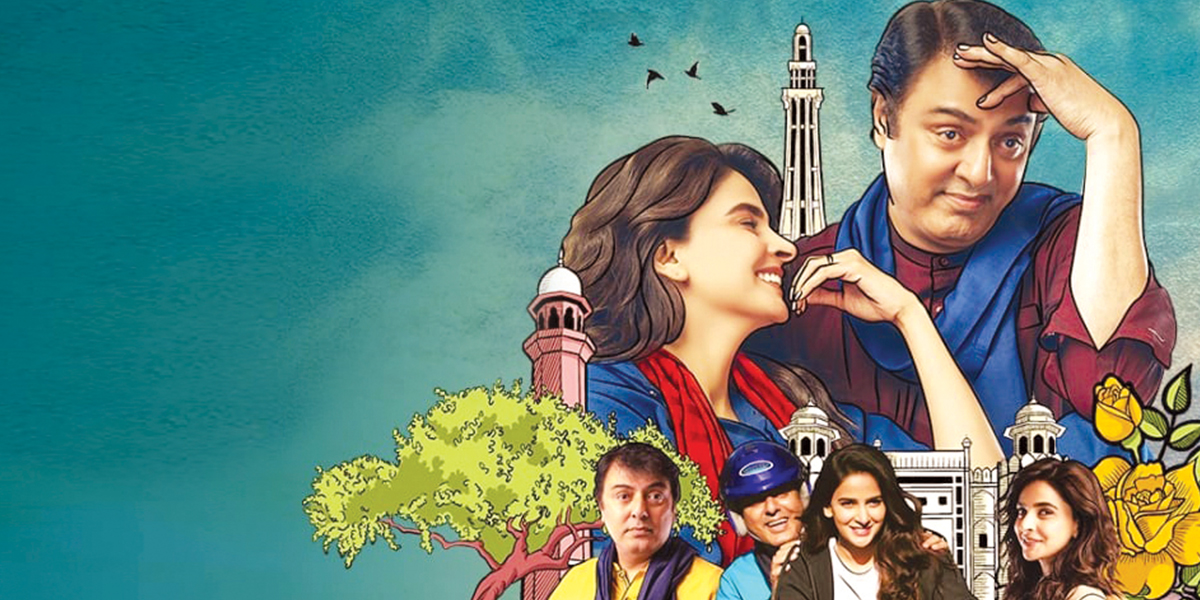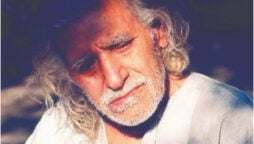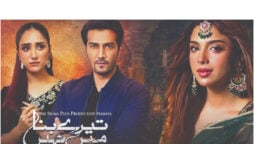Synopsis
Seldom do we come across a single series that tackles multiple social issues through the course of its run

Karachi: The 20 episode long series featuring Nauman Ijaz as Shameem and Saba Qamar as Umaina is an absolute game-changer, and we’re sharing with you why we think everyone should watch it! The series surpasses all the expectations and delivers a rather unconventional and unusual love story, in the most unforeseeable manner, while also raising several social issues. The series champions the cause of HIV and creates awareness about the disease, while also addressing issues like toxic masculinity, gender inequality, discrimination against the gay community, child abuse, harassment, divorce, infertility and mental health – especially post-partum depression.
The series successfully mirrors the society’s prejudices to men who are effeminate – that the society likes to call, sissy – played by Nauman Ijaz, Shameem is such a man who has always been in love with Umaina ever since he saw her for the first time. Umaina on the other hand fails to see his love and falls for the conventional man, Bilal played by Agha Mustafa, with whom she ends up getting pregnant. Too late to abort and too shunned to give birth, Umaina’s father and her step mother abandon her, leaving her with no other option but to live on the streets, and that’s where Shameem brings her home and offers to marry her and give the child his name and love. With no option left for Umaina, she marries Shameem but treats him like her punching bag, despising him.
Shameem on the other hand has nothing but love to offer in return. Once Umaina delivers the child, the series highlights how post-partum depression affects mothers, how big of an impact it has on their lives and the extent that they can go to if not treated. And Shameem does everything he can to support his wife and help her out of it, not only does he support her by taking care of the baby but also takes her to therapy and counsels her when needed. He also makes this child, Ali, his entire world and showers him with so much love and affection like it were his own son.

The show also sheds light on the grave issue of being harassed by trusted people. Fatima, Shameem’s niece is forcefully sent to a madrasah despite her protests where she’s assaulted over and over again by the man her father trusts the most. This turns her into a rebel and poisons her heart for her father.
Shameem’s sisters are also shown to be the typical brown women, oppressed by their husbands and taught to be patient with every hardship their husbands put their way without complaining or talking back. It also highlights how women in the society are blackmailed in the name of divorce and how families of the women lay helpless when the word divorce kicks in, giving in to the unreasonable demands by the husbands.
The series also explores the themes of infertility and how in most cases, women are held responsible for it rather than men. Shameem’s sister Humaira who has been labelled infertile by the society and her husband is so tormented that she tries every possible way to conceive – the mannats, the wazeefas, even black magic only to find out that it’s the man who is infertile and not her – from him calling her ‘baanjh’ to her calling him ‘na-mard.’ Her husband too mirrors the kind of men who don’t take no for an answer and do not respect women or their boundaries – something that most men can learn from.
As time passes, Shameem and Umaina’s child grows up to love Shameem, until he meets Rahim at school who turns out to be Bilal’s son. Ali instantly starts adoring his best friend’s dad and starts comparing him to Shameem causing a void between the two. Heartbroken at Ali’s distant self, Shameem tries changing himself, tries being more of a macho dad, all to no avail. And that’s when Umaina steps in to assure him that their son should love him for what he is and how he is. With children who bully Ali for being Shameem’s son and parents who laugh at Shameem are schooled by Umaina on what it takes to be a real man and how Shameem, who jumps into a blazing room to save kids, is the living and breathing example of it.
The series also shows how the society treats people who have different sexual orientation and while it doesn’t endorse homosexuality in any way, it shows how these people are treated like animals, disowned by their own families and their struggles to make ends meet. It also comes back to the themes of harassment and how scarring it can be for people.
Now, coming to one of the main concern the series addresses – HIV. The series brilliantly portrays how people react to HIV positive people, how it’s the ‘gandi beemari’ and how people automatically assume that it only comes through sexual contact, when in reality it can be transmitted via contact between broken skin, wounds, or mucous membranes and HIV-infected blood or blood-contaminated body fluids. You can’t help but suffer with the two as the society runs away from them and judges them for being HIV positive which is heart breaking. It successfully highlights the society’s prejudice to the disease and the diseased whilst raising awareness about it with examples of how to support the diseased.
The show also focuses on women being their own heroes, Shameem’s sisters who were initially told to deal with the hardships patiently learn to take a stand for themselves – all because their brother empowered them to. Shameem’s youngest sister who was living like a damsel in distress waiting for her Prince, chose to be her own hero and not only completed her Bachelors degree but even Masters and PhD. The other sister Humaira started her own business becoming financially stable for herself and Ali.
And as the series came to an end, it also talks about the inferiority complexes that a child faces and how all the factors play a vital role in shaping ones personality.
The show’s core message is that true love transcends all worldly standards and expectations. Both Umaina and Shameem may be social misfits, but their essential goodness of heart and their compassion form the basis for their newfound relationship. It’s a relationship that does not rest on physical attraction but rather mutual support, respect and infinite love that Shameem and Umaina have for each other and if you ask us, it’s one of the best series that we’ve come across. The narrative keeps changing throughout the story and it makes one realise the issues highlighted are quite common in several households and is a part of the regular lives of many. It does not normalise the issues but shows people evolving and becoming more understanding and accepting of the reality, while also taking a stand against the wrongdoings.
Nauman Ijaz’s acting as Shameem was an absolute treat to watch, from the body language to his helplessness to his expressions and eyes that spoke, this is probably one of the hardest roles he’s ever done and one that shall be remembered for years to come. Saba Qamar on the other hand was equally good as her character developed throughout the plot, Bay Ji played Gul-e-Rana was just as exceptional as the two and so was the supporting cast. The cinematography was spot on, the story was weaved beautifully as a narration, nothing felt forced or out of place, the script was brilliantly written and executed, the direction was flawless – just what we expected from the team!
Catch all the Breaking News Event and Latest News Updates on The BOL News
Download The BOL News App to get the Daily News Update & Live News.












 Read the complete story text.
Read the complete story text. Listen to audio of the story.
Listen to audio of the story.